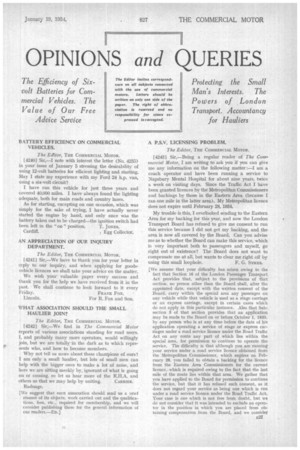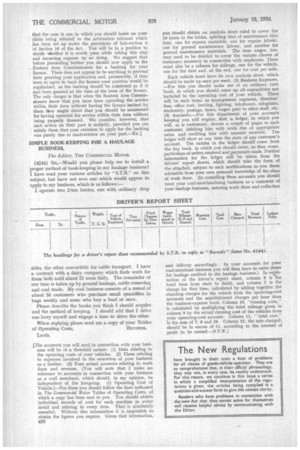OPINIONS and QUERIES The Efficiency of Sixvolt Batteries for CornMercial Vehicles. The Value of Our Free Advice Service
Page 37

Page 38

If you've noticed an error in this article please click here to report it so we can fix it.
Protecting the Small Man's Interests. The Powers of London Transport. Accountancy for Hauliers
BATTERY EFFICIENCY ON COMMERCIAL VEHICLES.
The Editor, TILE COMMERCIAL MOTOR.
[ 4240] Sir,—I note with interest the letter (No. 4235) in your issue of January 5 stressing the desirability of using 12-volt batteries for efficient lighting and starting. May I state my experience with my Ford 24 h.p. van, using a six-volt circuit?
I have run this vehicle for just three years and covered 40,000 miles. I have always found the lighting adequate, both for main roads and country lanes.
As for starting, excepting on one occasion, which was simply for the sake of trying, I have actually never started the engine by hand, and only once was the battery taken out to be charged—the ignition switch had been left in the " on " position. T. JoNEs, Cardiff. Egg Collector.
AN APPRECIATION OF OUR INQUIRY DEPARTMENT.
The Editor, THE COMMERCIAL MOTOR.
[4241] Sir,—We have to thank you for your letter in reply to our inquiry, and when applying for goodsvehicle licences we shall take your advice on the matter.
We wish your valuable paper every success and thank you for the help we have received from it in the past. We shall continue to look forward to it every
Friday. FRANK Fox,
Lincoln. For R. Fox and Son.
WHAT ASSOCIATION SHOULD THE SMALL HAULIER JOIN?
The Editor, THE COMMERCIAL MOTOR.
[4242] Sir,—We find in The Commercial Motor reports of various associations standing for road users. I, and probably many more operators, would willingly join, but we are totally in the dark as to which represents who, and how to become members.
Why not tell us more about these champions of ours? I am only a small haulier, but lots of small men can help with the bigger ones to make a lot of noise, and here we are sitting meekly by, ignorant of what is going on or coming, so let us hear more of the R.H.A. and
others so that we may help by uniting. CARRIER: Raclnage.
[We suggest that each association should send us a oriel résumé of its objects, work carried out and the qualifications, fees, etc., required for membership, and we will consider publishing these for the general information of Our readers.—En.]
A P.S.V. LICENSING PROBLEM.
The Editor, THE COMMERCIAL MOTOR.
[4243] Sir,—Being a regular reader of The Commercial Motor, I am writing to ask you if you can give me any information on the following matter :—I am a coach operator and have been running a service to Napsbury Mental Hospital for about nine years, twice a week on visiting days. Since the Traffic Act I have been granted licences by the Metropolitan Commissioners and backings by those in the Eastern Area (because I ran one mile in the latter area). My Metropolitan licence does not expire until February 28, 1934.
My trouble is this, I civet-rooked sending to the Eastern Area for my backing for this year, and now the London Transport Board has refused to give me consent to run this service because I did not get my backing, and the area is now all covered by the Board. Can you advise ma as to whether the Board can make this service, which is very important both to passengers and myself, go right out of existence? The Board does not want to compensate me at all, but wants to clear me right off by using this small loophole. F. G. SYKES.
[We assumethat your difficulty has arisen owing to the fact that Section 16 of the London Passenger Transport Act provides that, subject to the provisions of that section, no person other than the Board shall, after the appointed date, except with the written consent of the Board, carry within the special area any passenger on any vehicle while that vehicle is used as a stage carriage or an express carriage, except in certain cases which do not apply in this particular instance. Also that Subsection 3 of that section provides that an application may be made to the Board on or before October 1, 1933, by any person who is at any time before the date of his application operating a service of stage or express carriages under a road service licence under the Road Traffic Act. on any route any part of which lies within the special area, for permission to continue to operate the service. The difficulty is that although you are running your service under a road service licence obtained from the Metropolitan Commissioner, which expires on February 28, you failed to obtain a backing for the licence from the Eastern Area Commissioners for the current licence,which is required owing to the fact that the last mile of the route lies within that area. We gather that you have applied to the Board for permission to continue the service, but that it has refused such consent, as it does not regard your service as being one which is run under a road service licence under the Road Traffic Act. Your case is one which is not free from doubt, but we do not consider that it was intended to exclude an operator in the position in which you are placed from obtaining compensation from the Board, and we consider that the case is one in which you should insist on your claim being referred to the arbitration tribunal which has been set up under the provisions of Sub-section 5 of Section 16 of the Act. You will be in a position to decide whether it is worth your while taking this step and incurring expense by so doing. We suggest that before proceeding farther you should now apply to the Eastern Area Commissioners for a backing for your licence. There does not appear to be anything to prevent' their granting your application and, presumably, if they were to agree to back the licence your position would be regularized, as the backing should 'be construed as if it ,had been granted at the time of the issue of the licence. The only danger is that when the Eastern Area Commissioners know that you have been operating the service within their Area without having the licence backed by them limy might direct that you should be summoned for having operated the service within their Area without being properly licensed. We consider, however that such action on their part is unlikely, provided you can satisfy them that your omission to apply for the backing was purely due to inadvertence on your part.—En.) SIMPLE ROOK-KEEPING FOR A HAULAGE BUSINESS.
The Editor, THE COMMERCIAL MOTOR.
[4244] Sir.,—Would you please help me to install a proper method of book-keeping in my haulage business? I have read your various articles by " S.T.R." on this subject, but have not seen one which would appear to apply to my business, which is as follows :
I operate two 2-ton lorries, one with ordinary drop
sides, the other convertible for cattle transport. I have a contract with a dairy company which finds work for them both until about 12 noon daily. The remainder of our time is taken up by general haulage, cattle removing and coal trade. My coal business consists of a round of about 50 customers who purchase small quantities in bags weekly and some who buy a load at once.
Please describe -the books you think I should acquire and the method of keeping. I should add that I drive one lorry myself and engage a man to drive the other.
When replying please send me a copy of your Tables
of Operating Costs. RECORDS. Leeds.
[The accounts you will need in connection with your business will be of a threefold nature: (1) Data relating to the operating costs of your vehicles. (2) Those relating to expenses involved in the -execution of your business as a haulier. (3) Your actual accounts relating to work done and revenue. (You will note that I make no reference to accounts in connection with your business as .a coal merchant, which should, in my opinion, be independent of the foregoing. (1) Operating Cost of Vehicle.)—For these you should follow the lines indicated in The Commercial Motor Tables of Operating Costs, of which a copy has been sent to you. You should obtain individual records of cost for each machine in every detail and relating to every item. That is absolutely essential. Without this information it is impossible to obtain the figures you require. Given that information, B28 you should obtain an analysis sheet ruled to cover the 10 items in the tables, splitting that of maintenance into four, one for repairs materials, one for repairs labour, one for general maintenance labour, and another for general maintenance materials. The item wages, too, may need to be divided to cover the various classes of insurance necessary in connection with employees. There must also be a column for mileage, one for the vehicle, one for the date and, at the end, one for cost per mile.
Each vehicle must have its own analysis sheet, which should be made up once per week. (2) Business Expenses. —For this you should make use of an ordinary cash book, in which you should enter up all expenditure not included in the operating cost of your vehicle. There will be such items as management expenses, directors' fees, office rent, heating, lighting, telephones, telegrams, stationery, postage, taxes, wages paid to office staff. etc. (3) • Accounts—For this department of your accounts keeping you will require, first, a ledger, in which you will, as is customary, devote a couple of pages to each .customer, debiting him with work due at appropriate rates, and crediting him with amount received. The ledger will show at any time the state of any customer's account. The entries in the ledger should come from the day book, in which you should enter, as they come, particulars Kif orders received and payments made. Further information for the ledger will be taken from the drivers' report sheets, which should take the form of the attached, subject to such modifications as you deem advisable from your own personal knowledge of the class of work done. (In compiling these accounts you should treat your coal-merchandising business as a customer of your haulage business, entering work done and collection and delivery accordingly. In your accounts for your coal-merchant business you will then have to enter items for haulage credited to the haulage business.) In explanation of the driver's report sheet, column 6 is the total time from start to finish, and column 7 is the charge for that time, calculated by adding together the -standing charges for the vehicle from the operating-cost accounts and the establishment charges per hour from the business-expense book. Column 10, "running costs," is calculated by multiplying the total mileage given in column 9 by the actual running cost of the vehicles from your operating-cost account. Column 11, " total cost," is the sum of 7, 8 and 10. Column 12, the rate charged, should be in excess of 11, according to the amount of profit to be carnecl.—S.T.R.]




















































































